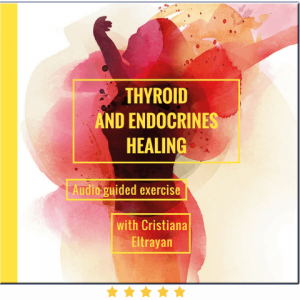“The thyroid, a butterfly-shaped gland in the center of your neck, is the master gland of metabolism. How well your thyroid is functioning is inter-related with every system in your body. If your thyroid is not running optimally, then neither are you.
10 signs of an under-active thyroid:
1. Fatigue after sleeping 8 to 10 hours a night or needing to take a nap daily.
2. Weight gain or the inability to lose weight.
3. Mood issues such as mood swings, anxiety or depression.
4. Hormone imbalances such as PMS, irregular periods, infertility and low sex drive.
5. Muscle pain, joint pain, carpal tunnel syndrome, or tendonitis.
6. Cold hands and feet, feeling cold when others are not, or having a body temperature consistently below 98.5.
7. Dry or cracking skin, brittle nails and excessive hair loss.
8. Constipation.
9. Mind issues such as brain fog, poor concentration or poor memory.
10. Neck swelling, snoring or hoarse voice.
Many symptoms of thyroid imbalance are vague and most doctors spend only a few minutes talking with patients to sort out the cause of their complaint.
Most conventional doctors use only one or two tests (TSH and T4) to screen for problems. They are not checking FT3, RT3 or thyroid antibodies.
Most conventional doctors use the ‘normal’ lab reference range as their guide only. Rather than listening to their patients’ symptoms, they use ‘optimal’ lab values and temperature as their guide.” Source: Amy Myers MD
“Other signs of an thyroid imbalance:
At the energetic level, the thyroid is connected with and supported by the communication energy, center, Vishuddha. Therefore, other symptoms might be:
- struggle of making yourself “heard”
- the feeling of always being misunderstood
- difficulties in speaking your truth or telling your oppinion
- inability of asking for what you want (from a salary raise to extra olives on your pizza)
- the fear of “disturbing” people with what you have to say
- the fear of saying no to what you don’t like
- the difficulty in being assertive (you’d rather “beat around the bush” when you have something to say)
- communication issues in your relationship/s
- guilt, shame or blame related to your sexuality or other aspects in your life
…and so on. ” Source: Cristiana Eltrayan, holistic therapist & author
What are 10 things you can do to improve your thyroid function?
1. Make sure you are taking a high quality multivitamin with Iodine, Zinc, Selenium, Iron, Vitamin D and B vitamins.
2. Take a tyrosine supplement to help with the FT4 to FT3 conversion.
3. Go gluten-free! If you have Hashimoto’s, try going completely grain and legume free.
4. Deal with your stress and support your adrenal glands. The adrenal glands and thyroid work hand and hand. I recommend restorative yoga and adaptogenic herbs, which support the adrenal glands in coping with stress.
5. Get 8 to 10 hours of sleep a night.
6. Have a biological dentist safely remove any amalgam fillings you may have.
7. Watch your intake of raw goitrogens. There is a bit of a debate surrounding this.
8. Get fluoride, bromide and chlorine out of your diet and environment.
9. Heal your gut. A properly functioning digestive system (gut) is critical to good health.” Source: Amy Myers MD
10. Find a holistic therapist and have them run the above laboratory test and work with you to find your root cause of the thyroid imbalance.
We also recommend: The Guided Meditation for Thyroid, Communication and Creativity
Which lab tests are best to determine if you have a thyroid problem?
I check the below panel on each of my patients. Make sure your doctor does the same for you.
TSH
Free T4
Free T3
Reverse T3
Thyroid Peroxidase Antibodies (TPOAb)
Thyroglobulin Antibodies (TgAb)
What are the ‘optimal’ lab values for thyroid tests?
In my practice, I have found that the below are the ranges in which my patients (and myself) thrive. I listen to my patients as well and take how they are feeling into account.
TSH 1-2 UIU/ML or lower (Armour or compounded T3 can artificially suppress TSH)
FT4 >1.1 NG/DL
FT3 > 3.2 PG/ML
RT3 less than a 10:1 ratio RT3:FT3
TPO – TgAb – < 4 IU/ML or negative
How does your thyroid gland work?
Thyroid hormone production is regulated by a feedback loop between the hypothalamus, pituitary gland and the thyroid gland. Hypothalamic thyrotropin-releasing hormone (TRH) stimulates pituitary thyrotropin (TSH) synthesis and secretion.
In turn, TSH stimulates production and release of T4 and T3 from the thyroid gland. When enough T4 is produced, it signals to TRH and TSH that there is enough thyroid hormone in circulation and not to produce more.
About 85% of the hormone produced by our thyroid gland is T4, which is an inactive form of the hormone. After T4 is made, a small amount of it is converted into T3, which is the active form of thyroid hormone.
To complicate matters, T3 also gets converted into either Free T3 (FT3) or Reverse T3 (RT3). It’s the Free T3 that really matters in all of this, since it’s the only hormone that can attach to a receptor and cause your metabolism to rise, keep you warm, keep your bowels moving, mind working, and other hormones in check. The role of Reverse T3 is not well known, however, I do see it elevated in persons under extreme stress and those who have mercury toxicity.” Source: Amy Myers MD
Click on the link for a good guided exercise for thyroid and relationships health: The Guided Meditation for Thyroid, Communication and Creativity





Works for me. Maybe we’ve slashdotted them and they’ve recovered?